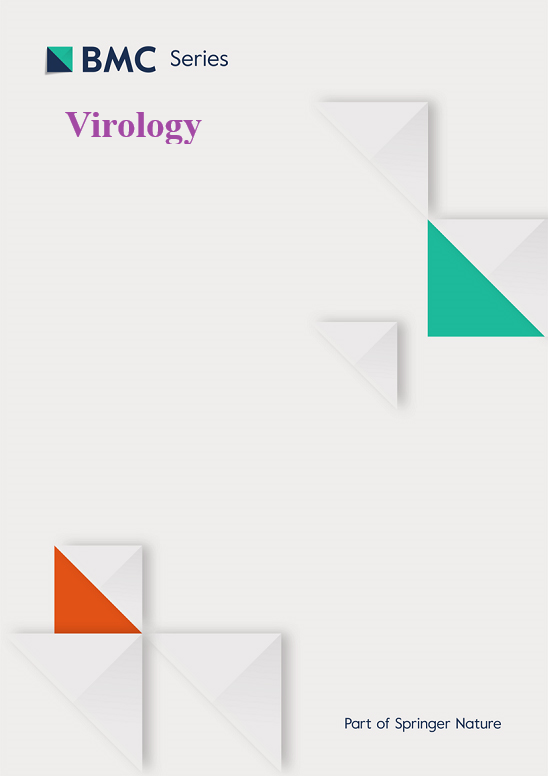Development of an apoptotic lentogenic Newcastle disease virus strain by incorporating the p30 protein of African swine fever virus
IF 2.8
3区 医学
Q3 VIROLOGY
引用次数: 0
Abstract
Virotherapy is one of the emerging approaches for cancer treatment. Newcastle disease virus (NDV) is a well-studied avian paramyxovirus commonly isolated from birds. Typically, the virulent strains of NDV are acknowledged for their oncolytic properties. The anti-tumor effects of NDV rely on its capacity to trigger apoptosis in cancer cells and elicit inflammatory immune responses against the tumor. However, the virulent strains pose significant challenges for clinical application. This study investigated the development of an apoptotic lentogenic strain of NDV by incorporating the p30 protein gene of the African swine fever virus (ASFV). Previous studies have indicated that the p30 protein interacts with various cellular proteins, including PARP9 and DAB2, which suggests its potential for direct or indirect influence on apoptotic pathways. Our initial data confirmed the upregulation of caspase 3/9, PARP, and cytochrome c, suggesting the pro-apoptotic nature of the p30 protein. Further, a recombinant NDV (rNDV) expressing p30 protein (rNDV-p30) was developed, and its effects were evaluated on human breast cancer (MCF-7) cells. While rNDV alone can't show apoptosis, its variant, rNDV-p30 showed promising apoptotic features in MCF-7 cells. Overall, the results demonstrated the development of rNDV-p30 as an apoptotic virus that offered a novel virotherapy strategy for cancer treatment. Additional research is needed to investigate the underlying mechanisms, safety, and efficacy of the apoptotic activity of the rNDV-p30 and to evaluate the effectiveness of this approach in animal models.
结合非洲猪瘟病毒p30蛋白的凋亡透镜原性新城疫病毒毒株的研制。
病毒疗法是一种新兴的癌症治疗方法。新城疫病毒(NDV)是一种从禽类中分离出来的禽副粘病毒。通常,NDV的毒力菌株以其溶瘤特性而闻名。NDV的抗肿瘤作用依赖于其触发癌细胞凋亡和引发针对肿瘤的炎症免疫反应的能力。然而,毒株对临床应用提出了重大挑战。本研究利用非洲猪瘟病毒(ASFV) p30蛋白基因,研究了NDV凋亡透镜原菌株的培养。先前的研究表明,p30蛋白与多种细胞蛋白相互作用,包括PARP9和DAB2,这表明它可能直接或间接影响凋亡途径。我们的初步数据证实了caspase 3/9、PARP和细胞色素c的上调,表明p30蛋白的促凋亡性质。进一步,制备了表达p30蛋白的重组NDV (rNDV-p30),并对其在人乳腺癌(MCF-7)细胞中的作用进行了评价。虽然rNDV本身不能导致细胞凋亡,但其变体rNDV-p30在MCF-7细胞中显示出有希望的凋亡特征。总的来说,这些结果表明rNDV-p30作为一种凋亡病毒的发展为癌症治疗提供了一种新的病毒治疗策略。rNDV-p30凋亡活性的潜在机制、安全性和有效性有待进一步研究,并在动物模型中评估该方法的有效性。
本文章由计算机程序翻译,如有差异,请以英文原文为准。
求助全文
约1分钟内获得全文
求助全文
来源期刊

Virology
医学-病毒学
CiteScore
6.00
自引率
0.00%
发文量
157
审稿时长
50 days
期刊介绍:
Launched in 1955, Virology is a broad and inclusive journal that welcomes submissions on all aspects of virology including plant, animal, microbial and human viruses. The journal publishes basic research as well as pre-clinical and clinical studies of vaccines, anti-viral drugs and their development, anti-viral therapies, and computational studies of virus infections. Any submission that is of broad interest to the community of virologists/vaccinologists and reporting scientifically accurate and valuable research will be considered for publication, including negative findings and multidisciplinary work.Virology is open to reviews, research manuscripts, short communication, registered reports as well as follow-up manuscripts.
 求助内容:
求助内容: 应助结果提醒方式:
应助结果提醒方式:


